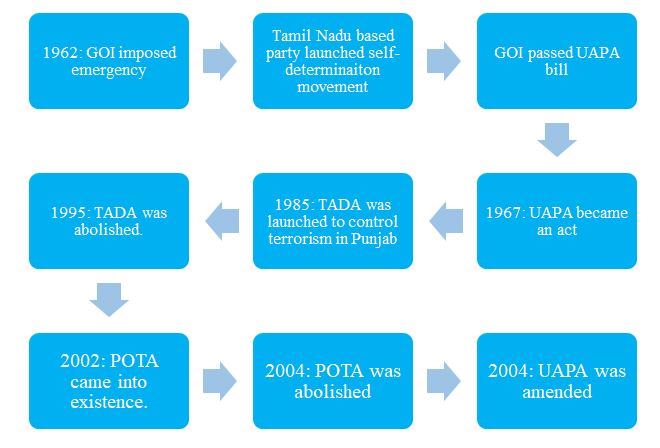 Introduction
Introduction
- The Unlawful Activities (Prevention)Act or UAPA was passed in the Indian Parliament in December 1967. The act was the 37th act passed since Independence.
- The act deals with unlawful activities that may cause secession or disruption of the unity and integrity of India.
- The scope of this act runs through the whole of India. Therefore, if a person commits an offense outside the borders of India, it is punishable under this act. In such cases, that person is punishable in the same manner as if the crime had been committed inside India.
- The act also applies to;
- all the citizens of India living outside the country,
- people who are serving the Government of India, and
- persons working on ships and aircrafts registered in India, irrespective of their location
- For detailed information, one may visit this website- Click Here
 UAPA
UAPA
The figure below shall reveal a timeline of how UAPA evolved over the years in India.
The above figure shows a timeline with details following:
- In 1962, the Government of India imposed an Emergency because of Chinese aggression.
- In the meantime, the Dravida Munnetra Kazhgam, a Tamil Nadu based party launched a movement for self-determination.
- To stop such anti-national activities, the Indian Government introduced the UAPA bill which became an Act in December 1967. With this, the National Integration council appointed a Committee. The committee would look into the aspects of reasonable restrictions in the interest of integrity and sovereignty of the country.
- In May 1985, another Act was passed to control terrorism in Punjab. This act was called the Terrorist and Disruptive Activities Act (TADA). However, this act had several weaknesses and so was later abolished in 1995.
- In December 2002, the Union Parliament passed the Prevention of Terrorism Act (POTA) to stop terrorism.
- POTA was being misused by people in power, and the act was abolished in 2004.
- At the same time in 2004, the UAPA was amended to deal with unlawful and terrorist activities and to prevent any misuse. Through this amendment, most of the provisions of POTA were incorporated.
- Implementation of UAPA aimed to make support to any secessionist movement a crime.
- Moreover, UAPA empowers the Indian Government to declare an organization a 'terrorist.' Such organizations can be banned, and mere membership of such proscribed organization is in itself a criminal offense.
- UAPA allows the detention of a person without a charge sheet for a period of up to 180 days and police custody of up to 30 days.
- Implementation of UAPA has helped to create a strong presumption against bail. Anticipatory bail is out of the question.
- Further, UAPA creates a presumption of guilt for terrorism offenses. These offenses are merely based on the evidence that is allegedly seized.
- UAPA authorizes the creation of special courts. These courts authorize with widespread discretion to hold in-camera proceedings. Secret witnesses are used, but there is no sunset clause. Provisions are there for mandatory periodic review.
- There are serious doubts about the integrity of the act; therefore, using this act, the police sometimes targets the intellectuals in the nation.
- In this way, the police are misusing the UAPA that appears in the form of a draconian law to terrorize masses into silence.
- UAPA mainly targets intellectuals and activists. As a result, there has been a clampdown on left-wing activists that has sparked a chorus of outraged protest emerging from human right defenders.
- Therefore, there is a need to define clearly the terms and phrases that are used in UAPA, so that no innocent persons are prosecuted.
- Moreover, the procedures laid down in UAPA must be strictly followed by the police. An enforcement agency can be established such that the agency keeps a check on the proper implementation of UAPA by police.
- Similarly, sanctions must be taken from the appropriate authority before the accused person is arrested.
| ShortForm | FullForm |
|---|---|
| GOI | Government of India |
| UAPA | Unlawful Activities Prevention Act |
| TADA | Terrorist and Disruptive Activities Act |
| POTA | Prevention of Terrorism Act |




